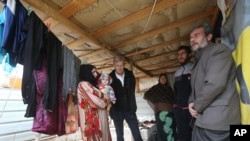This time last year, just over 9 million Syrians needed humanitarian assistance. Despite the fact that the U.N. Security Council has finally united around the demand that food, medicine and other lifesaving items get to the people who need them, this year the number has risen to 12.2 million in need.
With the civil war entering its fifth year next month, the number of refugees and internally displaced persons is also rising, with nearly 4 million having fled the country and 7.6 million displaced inside.
The U.N.’s deputy humanitarian chief, Kyung-Wha Kang, told the Security Council on Thursday that she was running out of words to describe the human and humanitarian toll.
She said aid organizations were able to reach nearly 3.5 million people last month with food aid, but of the 212,000 in parts of the country that are completely besieged, they reached only 304 people.
“The use of blockades of humanitarian aid and of basic services, including water and electricity, must stop, as must the indiscriminate attacks on civilians, including through barrel bombs, which have come to characterize this conflict,” Kang said.
Human Rights Watch issued a report this week accusing Syrian President Bashar al-Assad’s government of carrying out more than 1,000 airstrikes over rebel areas in Aleppo and 450 over the southern Daraa governorate. The rights group said satellite imagery showed the damage at the impact sites to be consistent with that caused by barrel bombs and conventional bombs dropped from helicopters.
The U.N. special envoy for Syria, Staffan De Mistura, announced last week that he had received commitments from the Assad regime to suspend aerial attacks for six weeks over Aleppo as the envoy tries to take a first step toward “freezing” the violence. He is seeking a similar suspension from armed opposition groups and is due back in Syria on Saturday as he tries to implement the temporary truce.
Humanitarian deputy Kang told the Security Council that if the freeze materializes, humanitarian agencies have developed plans to scale up aid deliveries across eastern Aleppo City.
“The U.N. will make use of any additional opportunities, including through the freeze, to expand humanitarian access,” she said.
Kang warned that funding is critical and that financial shortfalls have already forced the World Food Program to cut food rations by 30 percent.
In his monthly report on the delivery of aid in Syria, U.N. Secretary-General Ban Ki-moon warned that the conflict has “become business as usual.” He called for a commitment from the parties to implement U.N. resolutions.
Ban also reiterated his view that there can be no military or humanitarian solution to the conflict, only a political settlement.




